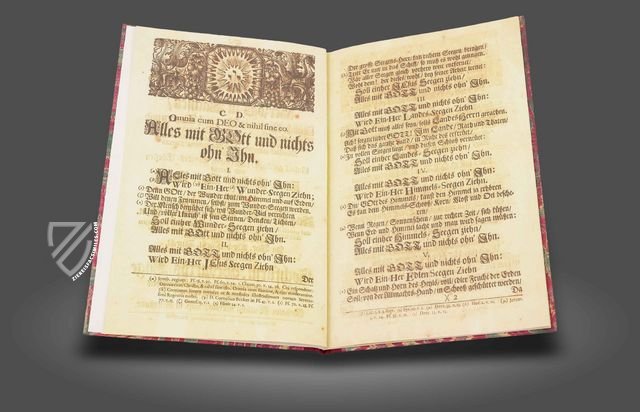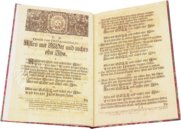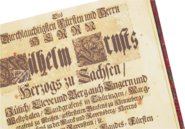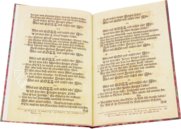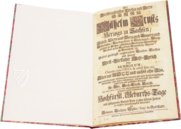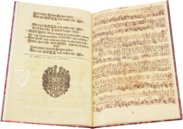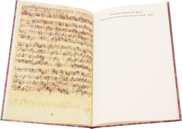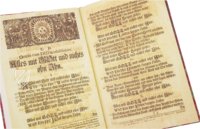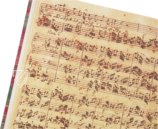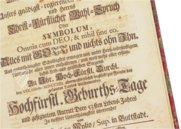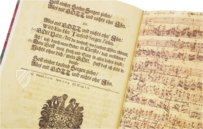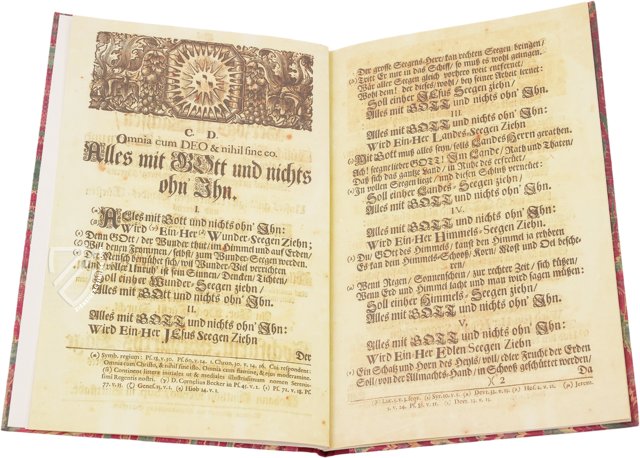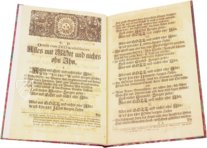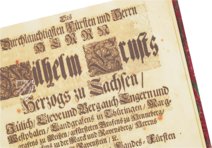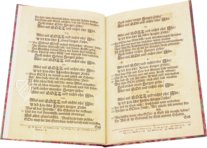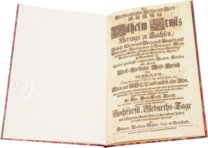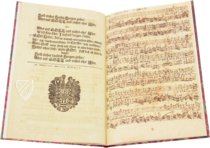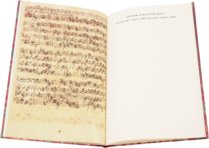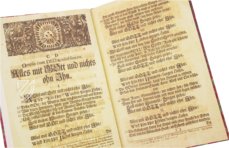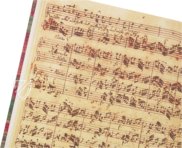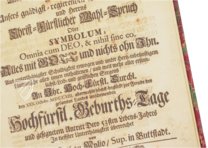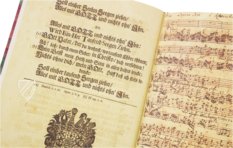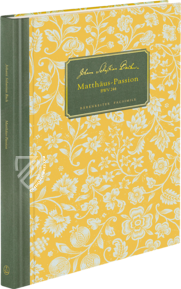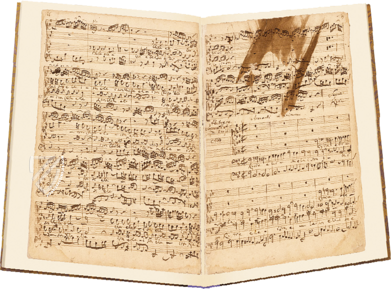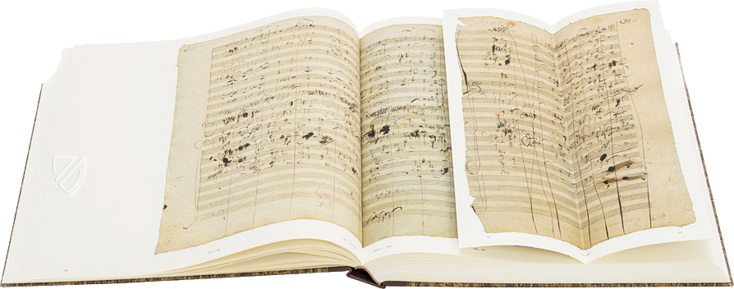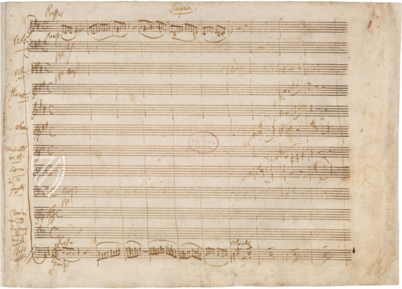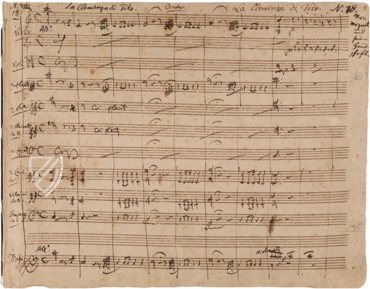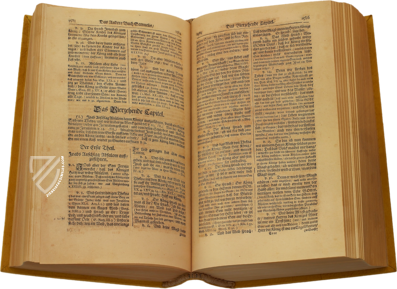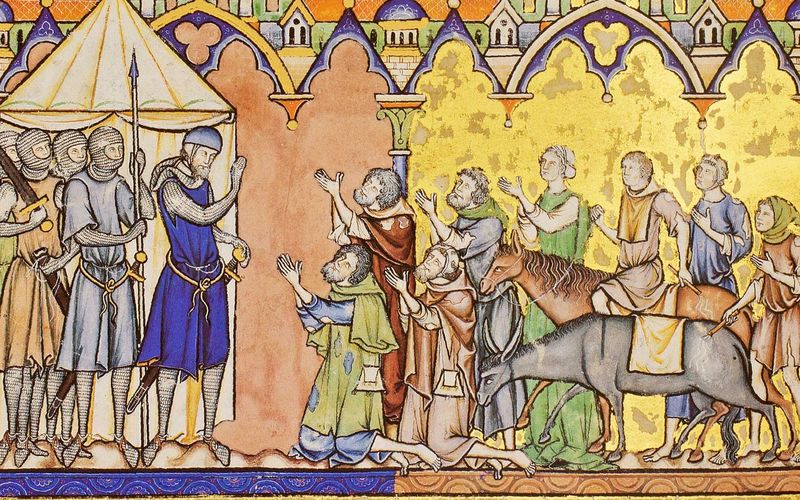Aria "Alles mit Gott und nichts ohn' ihn" BWV 1127
(under 1,000€)
The fame of Johann Sebastian Bach has only grown in the centuries since his death, and few things bring about as much excitement in the music world as the discovery of a previously-unknown Bach manuscript. This manuscript, discovered in Weimar in 2005, is especially fascinating because it represents the only strophic aria composed by Bach. Made for the Duke of Saxe-Weimar’s birthday, it is a pièce d’occasion of exquisite quality.
Aria "Alles mit Gott und nichts ohn' ihn" BWV 1127
In May 2005, the Leipzig-based musicologist Michael Maul made a sensational discovery in Weimar. He unearthed a manuscript of a sacred aria by Johann Sebastian Bach (1685–1750), which was previously completely unknown, while sifting through the Herzogin Anna Amalia Library. It was the first time since 1935 that a new Bach vocal work had been discovered. The aria consisting of twelve verses is written for solo soprano, strings and basso continuo and opens with the words Alles mit Gott und nichts ohn’ ihn – “everything with God and nothing without him”. It was composed in 1713 to celebrate the 53rd birthday of Duke Wilhelm Ernst of Saxe-Weimar (1662–1728), who employed Bach as court organist from 1708 until 1717. This vocal work represents Bach’s sole contribution to the genre of strophic aria. Each verse is accompanied by basso continuo and followed by a lively string ritornello, making this work a pièce d’occasion of exquisite quality. Not only is the original, recently discovered manuscript presented here, but it is accompanied by a recording of the world première with the soprano Elin Manahan Thomas and The English Baroque Soloists conducted by Sir John Eliot Gardiner.
A theological birthday poem
Bach's aria is based on the poem of the same name by Johann Anton Mylius, which he dedicated to the Duke for his birthday. Mylius composed twelve stanzas of eight lines each around the Duke's motto: Omnia cum Deo et nihil sine eo or Alles mit Gott und nichts ohn' ihn (Everything with God and nothing without him). As an acrostic, the poem contains numerous allusions and references not only to Wilhelm Ernst of Saxe-Weimar, but especially to biblical texts, which is not surprising given the ducal motto, but also Mylius's work as pastor and superintendent in Buttstädt. A six-page reproduction of the first original print from 1713 precedes Bach's score in this facsimile edition.
Codicology
- Alternative Titles
- Alles mit Gott und nichts ohn' Jhn : Aria Soprano Solo é Ritornello
- Type
- Manuscript on paper
- Size / Format
- 2 pages (+ 6 printed pages) / 31.5 × 19.5 cm
- Origin
- Germany
- Date
- 1713
- Epochs
- Style
- Genre
- Language
- Content
- Johann Anton Mylius poem "Alles mit Gott und nichts ohne ihn" and Johann Sebastian Bach's corresponding strophic aria for solo soprano, strings and basso continuo
- Patron
- Wilhelm Ernst, Duke of Saxe-Weimar
- Artist / School
- Johann Sebastian Bach (composer)
Johann Anton Mylius (poet)
Aria "Alles mit Gott und nichts ohn' ihn" BWV 1127
Wilhelm Ernst Duke of Saxe-Weimar
Apart from the A-initial at the beginning of the first stanza of Mylius' acrostic, the second line is particularly emphasized here by setting the initial letters of the individual words in a particularly airy manner. In addition to this visual cue, a footnote also points to the deeper meaning of the emphasis: the majuscules W, E, H, W, S, and Z correspond to the initials of the duke's full name: Wilhelm Ernst Herzog Zu Sachsen-Weimar - even if only almost in the correct order.
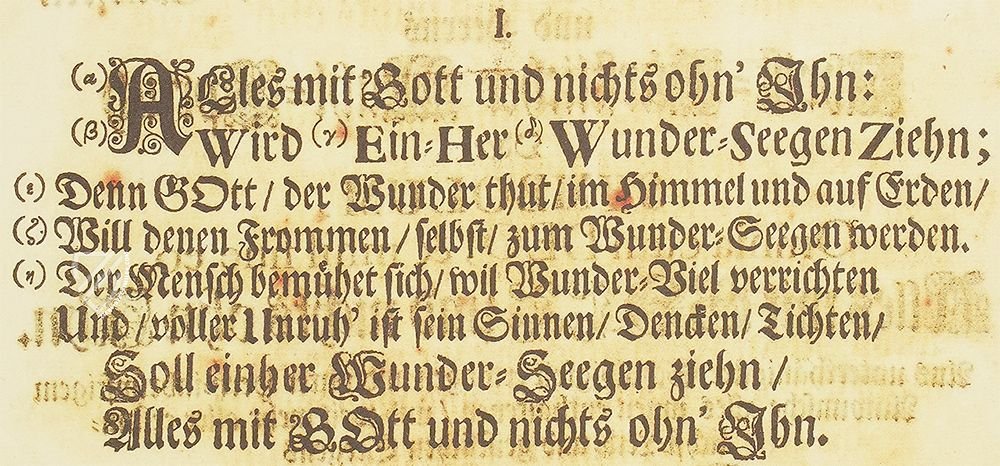
Aria "Alles mit Gott und nichts ohn' ihn" BWV 1127
Score manuscript by Johann Sebastian Bach
In his two-page score, Bach underlay only the first stanza of Mylius's poem, the text of which is housed almost entirely on the first page, yet the lively string ritornello follows on the verso. Between Bach's composition, the poet's lines appear in the composer's handwriting:
Alles mit Gott und nichts ohn' ihn (Everything with God and nothing without him)
wird einher Wundersegen ziehn. (Will draw wondrous blessings here.)
Denn Gott, der Wunder tut im Himmel und auf Erden, (While God, who performs miracles in heaven and on earth,)
will denen Frommen, selbst, zum Wundersegen werden. (Wants to become a wondrous blessing to the pious.)
Der Mensch bemühet sich, will Wunder viel verrichten, (Man toils, and wants to realise many miracles,)
und voller Unruh ist sein Sinnen, Denken, Dichten. (and his mind, thoughts, poetry, are full unrest.)
Soll einher Wundersegen ziehn, (Must draw wondrous blessings here.)
alles mit Gott und nichts ohn' ihn. (Everything with God and nothing without him)
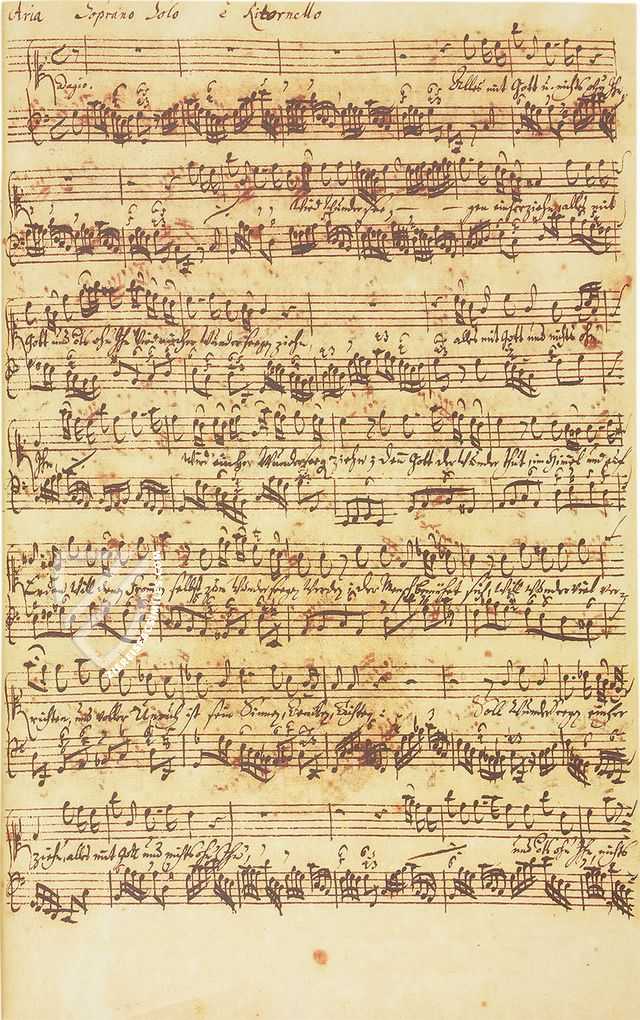
#1 Aria "Alles mit Gott und Nichts ohn' ihn"
(under 1,000€)
- Treatises / Secular Books
- Apocalypses / Beatus
- Astronomy / Astrology
- Bestiaries
- Bibles / Gospels
- Chronicles / History / Law
- Geography / Maps
- Saints' Lives
- Islam / Oriental
- Judaism / Hebrew
- Single Leaf Collections
- Leonardo da Vinci
- Literature / Poetry
- Liturgical Manuscripts
- Medicine / Botany / Alchemy
- Music
- Mythology / Prophecies
- Psalters
- Other Religious Books
- Games / Hunting
- Private Devotion Books
- Other Genres
- Afghanistan
- Armenia
- Austria
- Belgium
- Belize
- Bosnia and Herzegovina
- China
- Colombia
- Costa Rica
- Croatia
- Cyprus
- Czech Republic
- Denmark
- Egypt
- El Salvador
- Ethiopia
- France
- Germany
- Greece
- Guatemala
- Honduras
- Hungary
- India
- Iran
- Iraq
- Israel
- Italy
- Japan
- Jordan
- Kazakhstan
- Kyrgyzstan
- Lebanon
- Liechtenstein
- Luxembourg
- Mexico
- Morocco
- Netherlands
- Palestine
- Panama
- Peru
- Poland
- Portugal
- Romania
- Russia
- Serbia
- Spain
- Sri Lanka
- Sweden
- Switzerland
- Syria
- Tajikistan
- Turkey
- Turkmenistan
- Ukraine
- United Kingdom
- United States
- Uzbekistan
- Vatican City
- A. Oosthoek, van Holkema & Warendorf
- Aboca Museum
- Ajuntament de Valencia
- Akademie Verlag
- Akademische Druck- u. Verlagsanstalt (ADEVA)
- Aldo Ausilio Editore - Bottega d’Erasmo
- Alecto Historical Editions
- Alkuin Verlag
- Almqvist & Wiksell
- Amilcare Pizzi
- Andreas & Andreas Verlagsbuchhandlung
- Archa 90
- Archiv Verlag
- Archivi Edizioni
- Arnold Verlag
- ARS
- Ars Magna
- Art Market
- ArtCodex
- AyN Ediciones
- Azimuth Editions
- Badenia Verlag
- Bärenreiter-Verlag
- Belser Verlag
- Belser Verlag / WK Wertkontor
- Benziger Verlag
- Bernardinum Wydawnictwo
- BiblioGemma
- Biblioteca Apostolica Vaticana (Vaticanstadt, Vaticanstadt)
- Bibliotheca Palatina Faksimile Verlag
- Bibliotheca Rara
- Boydell & Brewer
- Bramante Edizioni
- Bredius Genootschap
- Brepols Publishers
- British Library
- C. Weckesser
- Caixa Catalunya
- Canesi
- CAPSA, Ars Scriptoria
- Caratzas Brothers, Publishers
- Carus Verlag
- Casamassima Libri
- Centrum Cartographie Verlag GmbH
- Chavane Verlag
- Christian Brandstätter Verlag
- Circulo Cientifico
- Club Bibliófilo Versol
- Club du Livre
- CM Editores
- Collegium Graphicum
- Collezione Apocrifa Da Vinci
- Comissão Nacional para as Comemorações dos Descobrimentos Portugueses
- Coron Verlag
- Corvina
- CTHS
- D. S. Brewer
- Damon
- De Agostini/UTET
- De Nederlandsche Boekhandel
- De Schutter
- Deuschle & Stemmle
- Deutscher Verlag für Kunstwissenschaft
- DIAMM
- Dropmore Press
- Droz
- E. Schreiber Graphische Kunstanstalten
- Ediciones Boreal
- Ediciones Grial
- Ediclube
- Edições Inapa
- Edilan
- Editalia
- Edition Deuschle
- Edition Georg Popp
- Edition Leipzig
- Edition Libri Illustri
- Editiones Reales Sitios S. L.
- Éditions de l'Oiseau Lyre
- Editions Medicina Rara
- Editorial Casariego
- Editorial Mintzoa
- Editrice Antenore
- Editrice Velar
- Edizioni Edison
- Egeria, S.L.
- Eikon Editores
- Electa
- Emery Walker Limited
- Enciclopèdia Catalana
- Eos-Verlag
- Ephesus Publishing
- Ernst Battenberg
- Eugrammia Press
- Extraordinary Editions
- Fackelverlag
- Facsimila Art & Edition
- Facsimile Editions Ltd.
- Facsimilia Art & Edition Ebert KG
- Faksimile Verlag
- Feuermann Verlag
- Folger Shakespeare Library
- Franco Cosimo Panini Editore
- Friedrich Wittig Verlag
- Fundación Hullera Vasco-Leonesa
- G. Braziller
- Gabriele Mazzotta Editore
- Gebr. Mann Verlag
- Gesellschaft für graphische Industrie
- Getty Research Institute
- Giovanni Domenico de Rossi
- Giunti Editore
- Graffiti
- Grafica European Center of Fine Arts
- Guido Pressler
- Guillermo Blazquez
- Gustav Kiepenheuer
- H. N. Abrams
- Harrassowitz
- Harvard University Press
- Helikon
- Hendrickson Publishers
- Henning Oppermann
- Herder Verlag
- Hes & De Graaf Publishers
- Hoepli
- Holbein-Verlag
- Houghton Library
- Hugo Schmidt Verlag
- Idion Verlag
- Il Bulino, edizioni d'arte
- ILte
- Imago
- Insel Verlag
- Insel-Verlag Anton Kippenberger
- Instituto de Estudios Altoaragoneses
- Instituto Nacional de Antropología e Historia
- Introligatornia Budnik Jerzy
- Istituto dell'Enciclopedia Italiana - Treccani
- Istituto Ellenico di Studi Bizantini e Postbizantini
- Istituto Geografico De Agostini
- Istituto Poligrafico e Zecca dello Stato
- Italarte Art Establishments
- Jan Thorbecke Verlag
- Johnson Reprint Corporation
- Johnson Reprint Corporation
- Josef Stocker
- Josef Stocker-Schmid
- Jugoslavija
- Karl W. Hiersemann
- Kasper Straube
- Kaydeda Ediciones
- Kindler Verlag / Coron Verlag
- Kodansha International Ltd.
- Konrad Kölbl Verlag
- Kurt Wolff Verlag
- La Liberia dello Stato
- La Linea Editrice
- La Meta Editore
- Lambert Schneider
- Landeskreditbank Baden-Württemberg
- Leo S. Olschki
- Les Incunables
- Liber Artis
- Library of Congress
- Libreria Musicale Italiana
- Lichtdruck
- Lito Immagine Editore
- Lumen Artis
- Lund Humphries
- M. Moleiro Editor
- Maison des Sciences de l'homme et de la société de Poitiers
- Manuscriptum
- Martinus Nijhoff
- Maruzen-Yushodo Co. Ltd.
- MASA
- Massada Publishers
- McGraw-Hill
- Metropolitan Museum of Art
- Militos
- Millennium Liber
- Müller & Schindler
- Nahar - Stavit
- Nahar and Steimatzky
- National Library of Wales
- Neri Pozza
- Nova Charta
- Oceanum Verlag
- Odeon
- Omnia Arte
- Orbis Mediaevalis
- Orbis Pictus
- Österreichische Staatsdruckerei
- Oxford University Press
- Pageant Books
- Parzellers Buchverlag
- Patrimonio Ediciones
- Pattloch Verlag
- PIAF
- Pieper Verlag
- Plon-Nourrit et cie
- Poligrafiche Bolis
- Presses Universitaires de Strasbourg
- Prestel Verlag
- Princeton University Press
- Prisma Verlag
- Priuli & Verlucca, editori
- Pro Sport Verlag
- Propyläen Verlag
- Pytheas Books
- Quaternio Verlag Luzern
- Reales Sitios
- Recht-Verlag
- Reichert Verlag
- Reichsdruckerei
- Reprint Verlag
- Riehn & Reusch
- Roberto Vattori Editore
- Rosenkilde and Bagger
- Roxburghe Club
- Salerno Editrice
- Saltellus Press
- Sandoz
- Sarajevo Svjetlost
- Schöck ArtPrint Kft.
- Schulsinger Brothers
- Scolar Press
- Scrinium
- Scripta Maneant
- Scriptorium
- Shazar
- Siloé, arte y bibliofilia
- SISMEL - Edizioni del Galluzzo
- Sociedad Mexicana de Antropología
- Société des Bibliophiles & Iconophiles de Belgique
- Soncin Publishing
- Sorli Ediciones
- Stainer and Bell
- Studer
- Styria Verlag
- Sumptibus Pragopress
- Szegedi Tudomànyegyetem
- Taberna Libraria
- Tarshish Books
- Taschen
- Tempus Libri
- Testimonio Compañía Editorial
- TGB Limited Editions
- Thames and Hudson
- The Clear Vue Publishing Partnership Limited
- The Facsimile Codex
- The Folio Society
- The Marquess of Normanby
- The Richard III and Yorkist History Trust
- Tip.Le.Co
- TouchArt
- TREC Publishing House
- TRI Publishing Co.
- Trident Editore
- Tuliba Collection
- Typis Regiae Officinae Polygraphicae
- Union Verlag Berlin
- Universidad de Granada
- Universitaire Bibliotheken Leiden
- University of California Press
- University of Chicago Press
- Urs Graf
- Vallecchi
- Van Wijnen
- VCH, Acta Humaniora
- VDI Verlag
- VEB Deutscher Verlag für Musik
- Verlag Anton Pustet / Andreas Verlag
- Verlag Bibliophile Drucke Josef Stocker
- Verlag der Münchner Drucke
- Verlag für Regionalgeschichte
- Verlag Styria
- Vicent Garcia Editores
- W. Turnowski Ltd.
- W. Turnowsky
- Waanders Printers
- Wiener Mechitharisten-Congregation (Wien, Österreich)
- Wissenschaftliche Buchgesellschaft
- Wissenschaftliche Verlagsgesellschaft
- Wydawnictwo Dolnoslaskie
- Xuntanza Editorial
- Zakład Narodowy
- Zollikofer AG

